|
|
|
Sort Order |
|
|
|
Items / Page
|
|
|
|
|
|
|
| Srl | Item |
| 1 |
ID:
175119
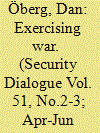

|
|
|
|
|
| Summary/Abstract |
This article analyzes how contemporary military training and exercises shape and reify specific modalities of war. Historically, military training has shifted from being individual- and experience-oriented, towards becoming modelled into exercise environments and practices. Drawing on semi-structured interviews with military officers, exercise controllers, and war-game designers, the article distinguishes between tactical training, characterized by military functions embodied through weapon platforms in a demarcated battlespace, and operational training, characterized by administrative and organizational processes embodied through self-referential staff routines. As military exercises integrate the tactical and operational dimensions into a model for warfare, they serve as blueprints for today’s battles at the same time as they perpetuate a martial viewpoint of the world. As a result, preparations for potential future conflicts constitute a fertile ground for apprehending the becoming of war.
|
|
|
|
|
|
|
|
|
|
|
|
|
|
|
|
| 2 |
ID:
175448
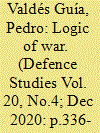

|
|
|
|
|
| Summary/Abstract |
At the origin of every war is an existential conflict and a recourse to violence that opens the “ontic” door of the enemy to transform him. Judgement corresponds to political logic, and violent existential transformation to the logic of war, which is engendered in that political matrix throughout the duration of hostilities. The objective nature of that logic structures the rationale of the theatre in terms of “performative” praxis, with two inseparable aspects: a violence that while destroying one order imposes an alternative one. The subjective nature of that logic is generated in its political matrix throughout the duration of the conflict, determining, in a dynamic way, its most basic formalization. Since war is engendered in politics, it adopts its character, a subjective nature that leads it to seek a peace treaty or a victory. In short, when the war begins, the political totality of each one of the belligerents starts to incorporate a new situation and, therefore, two logics coexist: one engendered in the other, and both conditioning each other. The symbiotic relationship between these two rationalities does not allow politics to dominate it according to the parameters of an instrumental reason.
|
|
|
|
|
|
|
|
|
|
|
|
|
|
|
|
| 3 |
ID:
133511
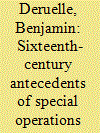

|
|
|
|
|
| Publication |
2014.
|
| Summary/Abstract |
The first conceptual, theoretical treatises about small war (la petite guerre) as special operations appeared only from the middle of the seventeenth century. The term is not used in the eighteenth-century sense of 'special operations' in older sources. The supposed absence of any treatment of the subject is surprising considering the obsession with the 'art of war' in the Renaissance, but other authors attribute it to a supposed antinomy between chivalric ideals and irregular warfare. But the absence of explicit manuals on the subject is not evidence of absence of advanced reflection on this kind of operations in the Middle Ages and in Early Modern times. We should thus look elsewhere, in other genres, for writings that contain and pass on military knowledge. Epics, romances, educational and military treatises, and memoirs in fact contain elements of a theory of special operations, even though these genres differ from our conception of rationality inherited from the Enlightenment.
|
|
|
|
|
|
|
|
|
|
|
|
|
|
|
|
| 4 |
ID:
165360
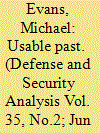

|
|
|
|
|
| Summary/Abstract |
The most effective way for the Western profession of arms to use history is to disavow the purism and narrow specialisation of today’s academia in favour of developing a contemporary approach to the subject. The latter aims to foster a range of applied diagnostic skills that transcend the temporal dimensions of past, present, and future. A contemporary approach to history for military professionals emphasises the use of inter-disciplinary war studies to enhance policy relevance. In any defense and security organisation, history must be usable in the sense of providing cognitive and interpretative skills for probing relationships between possibility and actuality, between experience and expectation, and between singularity and repetition. Using history to examine such dialectical interconnections is particularly valuable when military establishments confront their essential task of analyzing emerging trends in the future of war.
|
|
|
|
|
|
|
|
|
|
|
|
|
|
|
|
| 5 |
ID:
162416
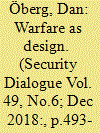

|
|
|
|
|
| Summary/Abstract |
This article argues that the politics of contemporary Western warfare finds an important reference point in discourses on military design. In the 2010s, military design has become a trending topic in military discourses on command and planning methodology. Since Clausewitz, warfare has been considered a phenomenon characterized by a tension between creativity and linear planning, and the ideal commander as someone with the vision to overcome this. By mapping and analyzing tactical, operational, and strategic narratives and practices, the article illustrates how they emphasize a warfare based both on experimentation and artistry and on traditional operational planning. In so doing, military design relies on reductive military concepts to push the tension identified by Clausewitz towards its extreme end-point, idealizing creativity as an objective of warfare. The article ends by asking to what extent military design risks spilling over into other dimensions of social and political life. It concludes that in pushing creativity as part of war, military design builds on and justifies transgressive political practices with the risk of becoming a vital aspect of future governing.
|
|
|
|
|
|
|
|
|
|
|
|
|
|
|
|
| 6 |
ID:
186204
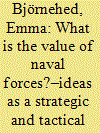

|
|
|
|
|
| Summary/Abstract |
There are several, often mentioned, strategic and tactical advantages related to naval forces which occur as a result of their inherent characteristics. Because they possess both mobility and a light footprint, naval forces have the ability to be simultaneously present in a given place while being minimally intrusive, a feat no other service branch can accomplish: “[t]he fact that naval forces can ´loiter´ and be minimally intrusive is an important and unique contribution to deterrence. The Army can loiter, but it cannot be minimally intrusive; the Air Force can be minimally intrusive but it cannot loiter. Only naval forces can do both simultaneously” (UK Maritime Power 2017, 37). Moreover, with the sea as the area of operations naval forces are an essential instrument for the state not only in war, but in peacetime as well. In comparison to the army and air force, naval forces are useful to the state outside a war context as they provide prosperity to the state through the protection of shipping lanes and civilian vessels. Given these inherent and unique characteristics and our unchanging dependence on the sea for goods and trade, the value of naval forces would seem self-evident.
|
|
|
|
|
|
|
|
|
|
|
|
|
|
|
|
|
|
|
|
|